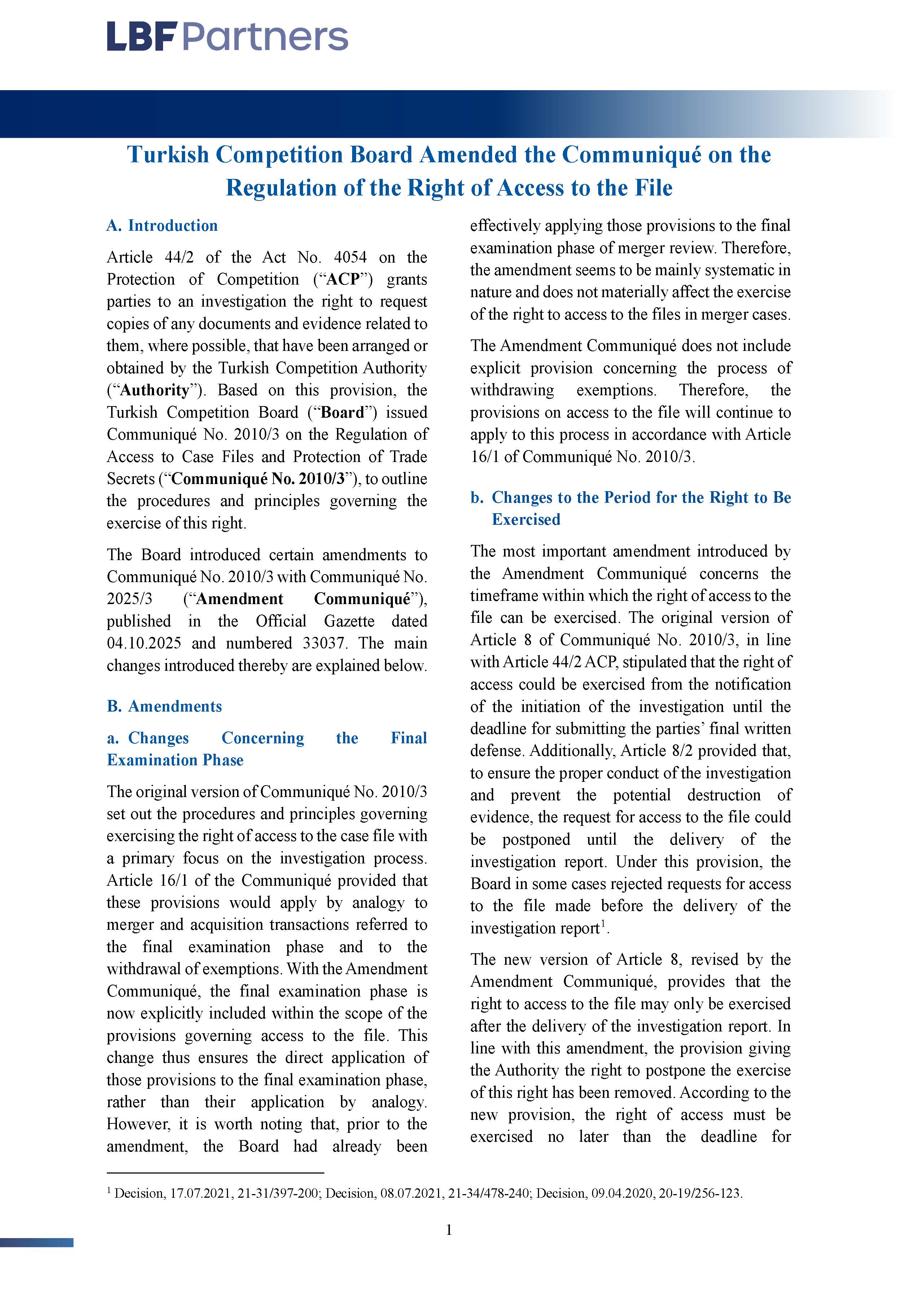Turkish Competition Board Amended the Communiqué on the Regulation of the Right of Access to the File
A. Introduction
Article 44/2 of the Act No. 4054 on the Protection of Competition (“ACP”) grants parties to an investigation the right to request copies of any documents and evidence related to them, where possible, that have been arranged or obtained by the Turkish Competition Authority (“Authority”). Based on this provision, the Turkish Competition Board (“Board”) issued Communiqué No. 2010/3 on the Regulation of Access to Case Files and Protection of Trade Secrets (“Communiqué No. 2010/3”), to outline the procedures and principles governing the exercise of this right.
The Board introduced certain amendments to Communiqué No. 2010/3 with Communiqué No. 2025/3 (“Amendment Communiqué”), published in the Official Gazette dated 04.10.2025 and numbered 33037. The main changes introduced thereby are explained below.
B. Amendments
a. Changes Concerning the Final Examination Phase
The original version of Communiqué No. 2010/3 set out the procedures and principles governing exercising the right of access to the case file with a primary focus on the investigation process. Article 16/1 of the Communiqué provided that these provisions would apply by analogy to merger and acquisition transactions referred to the final examination phase and to the withdrawal of exemptions. With the Amendment Communiqué, the final examination phase is now explicitly included within the scope of the provisions governing access to the file. This change thus ensures the direct application of those provisions to the final examination phase, rather than their application by analogy. However, it is worth noting that, prior to the amendment, the Board had already been effectively applying those provisions to the final examination phase of merger review. Therefore, the amendment seems to be mainly systematic in nature and does not materially affect the exercise of the right to access to the files in merger cases.
The Amendment Communiqué does not include explicit provision concerning the process of withdrawing exemptions. Therefore, the provisions on access to the file will continue to apply to this process in accordance with Article 16/1 of Communiqué No. 2010/3.
b. Changes to the Period for the Right to Be Exercised
The most important amendment introduced by the Amendment Communiqué concerns the timeframe within which the right of access to the file can be exercised. The original version of Article 8 of Communiqué No. 2010/3, in line with Article 44/2 ACP, stipulated that the right of access could be exercised from the notification of the initiation of the investigation until the deadline for submitting the parties’ final written defense. Additionally, Article 8/2 provided that, to ensure the proper conduct of the investigation and prevent the potential destruction of evidence, the request for access to the file could be postponed until the delivery of the investigation report. Under this provision, the Board in some cases rejected requests for access to the file made before the delivery of the investigation report.[1]
The new version of Article 8, revised by the Amendment Communiqué, provides that the right to access to the file may only be exercised after the delivery of the investigation report. In line with this amendment, the provision giving the Authority the right to postpone the exercise of this right has been removed. According to the new provision, the right of access must be exercised no later than the deadline for submitting the first written defense, or in the case of additional written comments by the investigation team, the deadline for the submitting the second written defense. Given that Article 44/2 ACP grants the right of access to the file after the initiation of the investigation, the legality of postponing the exercise of this right until the delivery of the investigation report may be subject to controversy.
c. Amendments Regarding the Scope of Internal Correspondence
Article 7 of the Communiqué has been revised to broaden the scope of documents explicitly classified as “internal correspondence”. The new provision explicitly includes all reports prepared by the Authority, including the preliminary investigation and investigation reports, within the definition of internal correspondence. Since the Board had already treated these reports as internal correspondence in practice prior to the amendment, this clarification aligns with the Board’s existing practice. [2]
Additionally, the Amendment Communiqué explicitly includes the settlement protocol and the settlement document, within the scope of internal correspondence. The protocol and annexes prepared during on-site inspections are also now explicitly considered internal correspondence. Such inclusion is in line with the Board’s practice of classifying settlement documents and on-site inspection protocols as internal correspondence before the amendment.[3]
d. Changes Regarding the Access Rights of Third Parties
The original version of Article 5/3 of Communiqué No. 2010/3 stated that the requests of complainants and third parties would be evaluated in accordance with general provisions. In the past, the Board had rejected requests for access to the file from complainants, reasoning that the right of access was only granted to parties involved in the investigation or final examination.[4]
The Amendment Communiqué removes the provision stating that the requests of complainants and third parties would be evaluated in line with general provisions, as well as the definition of “complainant”. However, the debate about whether complainants and other third parties can exercise the right to access the file under the Right to Information Law No. 4982 is likely to continue after the amendment.
e. Transitional Provision
The provisional Article 1, added to Communiqué No. 2010/3, states that the changes introduced by the Amendment Communiqué shall not apply to ongoing investigations.
C. Conclusion
The Amendment Communiqué clarifies and systematizes the procedures and principles regarding the right of access to the file. The most fundamental change introduced by this Communiqué is the postponement of the exercise of the right until after the notification of the investigation report. Another noteworthy change is the explicit classification of the initial examination and preliminary investigation reports, along with other reports prepared by the Authority, as well as the minutes and documents created during the settlement process or on-site investigation, as internal correspondence, thereby formalizing the Board’s prior practice.
For more information and support, please feel free to contact us.
[1] Decision, 17.07.2021, 21-31/397-200; Decision, 08.07.2021, 21-34/478-240; Decision, 09.04.2020, 20-19/256-123.
[2] In its decision dated 16.01.2025, numbered 25-02/52-33, the Board considered the preliminary investigation and the initial review reports as internal correspondence and rejected the applicant’s request for access. In decision dated 19.11.2020, numbered 20-50/693-304, the Board considered the preliminary investigation report as internal correspondence which does not constitute exculpatory or incriminating evidence.
[3] Decision, 13.10.2022, 22-47/681-291; Decision 27.07.2024, 24-27/650-270.
[4] Decision, 03.05.2016, 16-15/246-108.
Article 44/2 of the Act No. 4054 on the Protection of Competition (“ACP”) grants parties to an investigation the right to request copies of any documents and evidence related to them, where possible, that have been arranged or obtained by the Turkish Competition Authority (“Authority”). Based on this provision, the Turkish Competition Board (“Board”) issued Communiqué No. 2010/3 on the Regulation of Access to Case Files and Protection of Trade Secrets (“Communiqué No. 2010/3”), to outline the procedures and principles governing the exercise of this right.
The Board introduced certain amendments to Communiqué No. 2010/3 with Communiqué No. 2025/3 (“Amendment Communiqué”), published in the Official Gazette dated 04.10.2025 and numbered 33037. The main changes introduced thereby are explained below.
B. Amendments
a. Changes Concerning the Final Examination Phase
The original version of Communiqué No. 2010/3 set out the procedures and principles governing exercising the right of access to the case file with a primary focus on the investigation process. Article 16/1 of the Communiqué provided that these provisions would apply by analogy to merger and acquisition transactions referred to the final examination phase and to the withdrawal of exemptions. With the Amendment Communiqué, the final examination phase is now explicitly included within the scope of the provisions governing access to the file. This change thus ensures the direct application of those provisions to the final examination phase, rather than their application by analogy. However, it is worth noting that, prior to the amendment, the Board had already been effectively applying those provisions to the final examination phase of merger review. Therefore, the amendment seems to be mainly systematic in nature and does not materially affect the exercise of the right to access to the files in merger cases.
The Amendment Communiqué does not include explicit provision concerning the process of withdrawing exemptions. Therefore, the provisions on access to the file will continue to apply to this process in accordance with Article 16/1 of Communiqué No. 2010/3.
b. Changes to the Period for the Right to Be Exercised
The most important amendment introduced by the Amendment Communiqué concerns the timeframe within which the right of access to the file can be exercised. The original version of Article 8 of Communiqué No. 2010/3, in line with Article 44/2 ACP, stipulated that the right of access could be exercised from the notification of the initiation of the investigation until the deadline for submitting the parties’ final written defense. Additionally, Article 8/2 provided that, to ensure the proper conduct of the investigation and prevent the potential destruction of evidence, the request for access to the file could be postponed until the delivery of the investigation report. Under this provision, the Board in some cases rejected requests for access to the file made before the delivery of the investigation report.[1]
The new version of Article 8, revised by the Amendment Communiqué, provides that the right to access to the file may only be exercised after the delivery of the investigation report. In line with this amendment, the provision giving the Authority the right to postpone the exercise of this right has been removed. According to the new provision, the right of access must be exercised no later than the deadline for submitting the first written defense, or in the case of additional written comments by the investigation team, the deadline for the submitting the second written defense. Given that Article 44/2 ACP grants the right of access to the file after the initiation of the investigation, the legality of postponing the exercise of this right until the delivery of the investigation report may be subject to controversy.
c. Amendments Regarding the Scope of Internal Correspondence
Article 7 of the Communiqué has been revised to broaden the scope of documents explicitly classified as “internal correspondence”. The new provision explicitly includes all reports prepared by the Authority, including the preliminary investigation and investigation reports, within the definition of internal correspondence. Since the Board had already treated these reports as internal correspondence in practice prior to the amendment, this clarification aligns with the Board’s existing practice. [2]
Additionally, the Amendment Communiqué explicitly includes the settlement protocol and the settlement document, within the scope of internal correspondence. The protocol and annexes prepared during on-site inspections are also now explicitly considered internal correspondence. Such inclusion is in line with the Board’s practice of classifying settlement documents and on-site inspection protocols as internal correspondence before the amendment.[3]
d. Changes Regarding the Access Rights of Third Parties
The original version of Article 5/3 of Communiqué No. 2010/3 stated that the requests of complainants and third parties would be evaluated in accordance with general provisions. In the past, the Board had rejected requests for access to the file from complainants, reasoning that the right of access was only granted to parties involved in the investigation or final examination.[4]
The Amendment Communiqué removes the provision stating that the requests of complainants and third parties would be evaluated in line with general provisions, as well as the definition of “complainant”. However, the debate about whether complainants and other third parties can exercise the right to access the file under the Right to Information Law No. 4982 is likely to continue after the amendment.
e. Transitional Provision
The provisional Article 1, added to Communiqué No. 2010/3, states that the changes introduced by the Amendment Communiqué shall not apply to ongoing investigations.
C. Conclusion
The Amendment Communiqué clarifies and systematizes the procedures and principles regarding the right of access to the file. The most fundamental change introduced by this Communiqué is the postponement of the exercise of the right until after the notification of the investigation report. Another noteworthy change is the explicit classification of the initial examination and preliminary investigation reports, along with other reports prepared by the Authority, as well as the minutes and documents created during the settlement process or on-site investigation, as internal correspondence, thereby formalizing the Board’s prior practice.
For more information and support, please feel free to contact us.
[1] Decision, 17.07.2021, 21-31/397-200; Decision, 08.07.2021, 21-34/478-240; Decision, 09.04.2020, 20-19/256-123.
[2] In its decision dated 16.01.2025, numbered 25-02/52-33, the Board considered the preliminary investigation and the initial review reports as internal correspondence and rejected the applicant’s request for access. In decision dated 19.11.2020, numbered 20-50/693-304, the Board considered the preliminary investigation report as internal correspondence which does not constitute exculpatory or incriminating evidence.
[3] Decision, 13.10.2022, 22-47/681-291; Decision 27.07.2024, 24-27/650-270.
[4] Decision, 03.05.2016, 16-15/246-108.








 Download PDF
Download PDF

 k.bas@lbfpartners.com
k.bas@lbfpartners.com